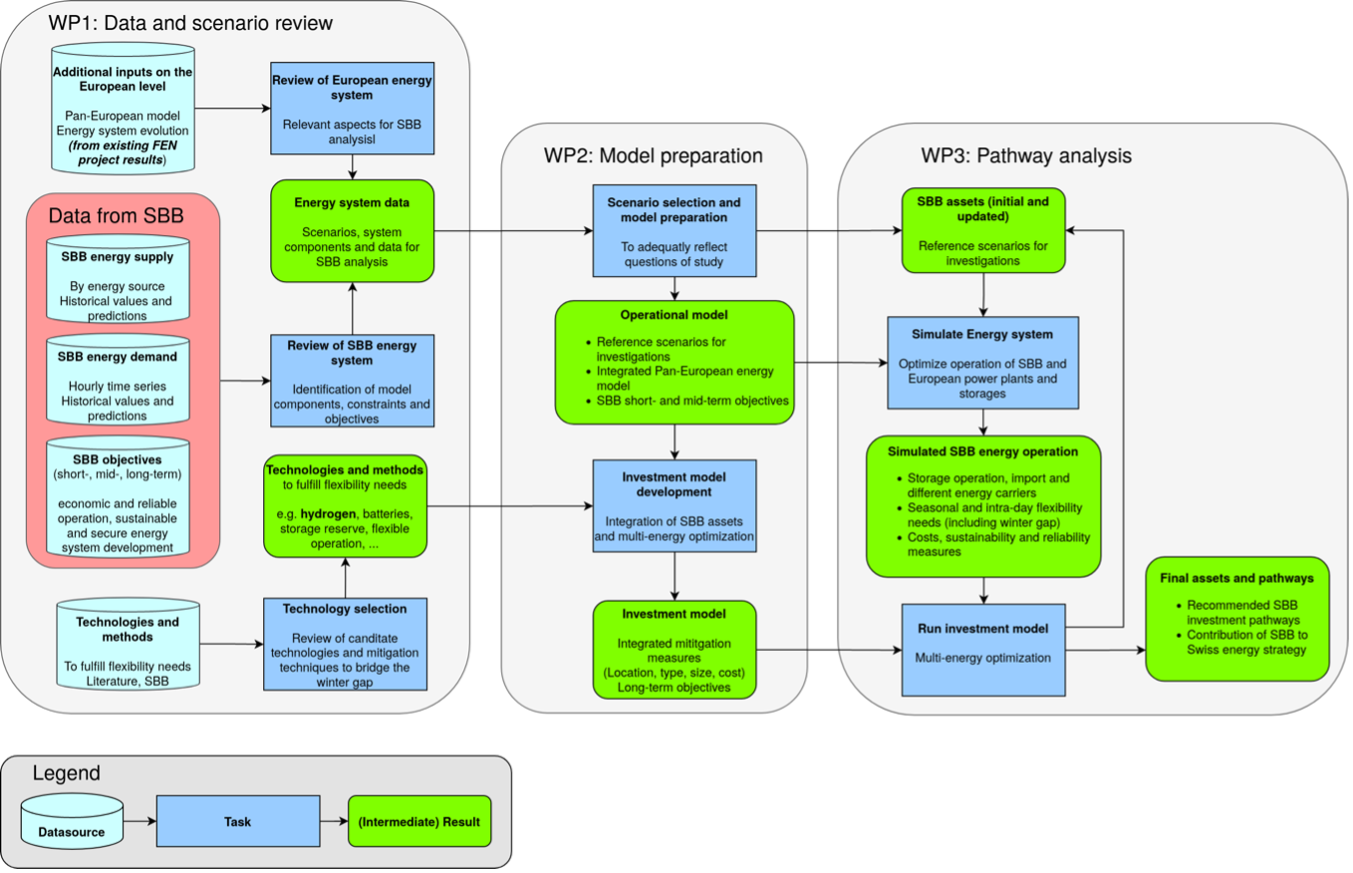RESAIL
Reliable and economic integration of the Swiss Federal Railways to the energy strategy
Partners: ETHZ FEN & PSL, SBB
Duration: 01/2023 - 12/2024
Funding: ETH Center for Sustainable Future Mobility (CSFM) - Mobility Initiative
Project Leader: ETHZ (FEN)
Project Team: Dr. Adamantios Marinakis, Dr. Turhan Demiray, Dr. Andre Bellè, Prof. Dr. Gabriela Hug
Objective of this project is to identify ways for the Swiss Federal Railways (SBB) to contribute to the Swiss energy strategy while, in parallel, ensuring that SBB will be able to serve its demand in an economic and reliable manner.
Specific focus will be given to the risks stemming from the so-called “winter gap”, i.e., the anticipated potential lack of energy adequacy during the winter period in future energy systems dominated by variable renewable sources.
A set of technology options that SBB can pursue will be investigated in a “sector coupled” approach, thus allowing to appropriately consider the synergies among energy carriers (electricity, hydrogen, synthetic fuels) and energy demand sectors (e.g., electricity demand of SBB and heat demand of a city).
Precisely, the project will address the following research challenges:
- What would be an optimal contribution of the railway sector to the Swiss energy transition?
e.g., by increasing its passenger and freight transport capabilities
e.g., by providing flexibility to the Swiss energy system - How can the Swiss railways ensure that it reliably and economically satisfies its demand throughout the energy transition period and in the long-term?
e.g., by investing in appropriate power generation and energy storage technologies such as solar, batteries, electrolyzers, hydrogen storage, fuel cells, synthetic fuels
e.g., by collaborating with cities to couple the SBB demand for power with the cities demand for heating, hence enhancing the overall efficiency
Switzerland and the rest of Europe are progressively transforming their energy systems to reach net-zero emissions by 2050 while ensuring that the energy needs of their citizens and industry are met economically and reliably. Today, transportation of people and goods, a critical pillar of our modern societies, contributes to roughly one third of the Swiss demand for energy, with a rather heavy CO2 footprint. Electrification of passenger transport and increase of its energy efficiency by means of higher share of public transport are seen as two important contributors towards decarbonization of transportation.
Clearly, the Swiss Federal Railways (SBB), the backbone of public transport in Switzerland, which covers its energy needs by its own electricity production, are expected to play an important role in the energy transition due to its role as the backbone of a future CO2-free Swiss public transport system, able to serve an increasing number of customers (switching from private transport means). A strategy for SBB to contribute to the energy transition, by upgrading its transport and energy production capabilities in an economic, efficient and realistic manner, is of outmost importance.
At the same time, the energy transition raises risks regarding the ability of the Swiss and European energy systems to serve the energy needs in a reliable manner. This holds specifically true during the transition pathway, when the final future energy system is not yet fully in place. For example, very high proliferation of solar power in Switzerland and rest of Europe without timely availability of adequate power regulation capabilities might endanger the security of supply. Uninterrupted operation of the Swiss federal railways is, however, extremely critical for the Swiss society and economy. As a result, it might be expected that SBB timely hedges itself against those risks.
SBB represents an important customer connected to the Swissgrid high voltage electricity network, both importing and exports electricity throughout the year. Currently, SBB covers a non-negligible share of its electricity demand by means of nuclear power units. As these units are planned to be decommissioned in the future, while, in parallel, the energy demand for railway transport is expected to increase, SBB will need to either increase the amount of electricity imported from the Swiss transmission network or rely on an increase of its power generation capacity (e.g., by means of solar).
Even if SBB can produce enough electricity to cover its demand on an annual basis, it is expected that there will be a significant deficit during the winter, due to limited solar and hydro availability. Solely relying on the Swiss power transmission (and implicitly the interconnected European) system for covering this "winter gap" might be both uneconomic and unreliable, as it is likely that the same reasons which are expected to cause the winter gap for SBB will hold true at Swiss or even European level as well.
The performed research will be based on the identification of a set of potential future basic and risk scenarios and on the formulation and solution of optimization problems. Even though the emphasis of the project lies on the options that SBB can pursue, the modeling will consider evolution scenarios of Switzerland as well as of the entire Europe, thus appropriately capturing the temporal and spatial correlations and associated risks.
The risk analysis will identify scenarios (e.g., a drought year, or a prolonged period of reduced wind and solar availability) which might particularly stress the ability of SBB to satisfy its demand. The formulated optimization problems will model technology limitations such as potential, time-to-build, various costs and risks. SBB will be closely engaged in the project, by providing data and participating in technical discussions and workshops.
The outcome of this project will make up a very valuable input to SBB, to be utilized in devising its mid/long-term energy strategy and in setting up follow-up projects and pilots.
In-house tool FlexECO will be used for implementation.

